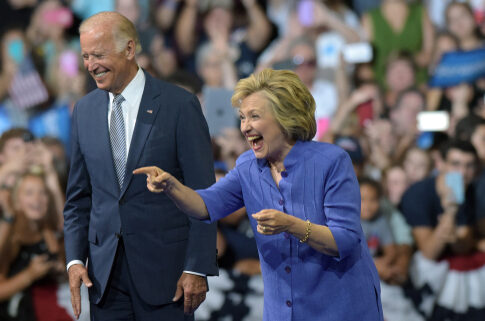Hillary Clinton’s conditional offer to nominate President Trump for the Nobel Peace Prize if he delivers a genuine Ukraine peace deal has stunned both sides of the political aisle, exposing the high stakes and the rarely acknowledged potential for conservative-led diplomacy to reshape global affairs.
Clinton’s Conditional Endorsement Raises the Bar for Peace
On August 15, 2025, Hillary Clinton, the former Secretary of State and longtime Democratic leader, declared on the “Raging Moderates” podcast that she would personally nominate President Trump for the Nobel Peace Prize if he secures an end to the Russia-Ukraine war—so long as Ukraine does not cede any territory to Russia. This statement, released just hours before Trump’s summit with Vladimir Putin in Anchorage, Alaska, highlights a rare moment of public acknowledgment between two of America’s most bitter political rivals. Clinton’s offer is far from an open endorsement; it sets a high bar, demanding that any peace agreement protects Ukraine’s territorial integrity and does not reward Russian aggression.
Clinton’s remarks immediately drew major media attention and sparked debate across the political spectrum. For conservative Americans, especially those frustrated by years of diplomatic stagnation and “woke” virtue-signaling from the previous administration, this acknowledgment is significant. It validates the seriousness of Trump’s efforts on the world stage, in sharp contrast to the performative gestures that have too often characterized foreign policy under leftist leadership. The Nobel Peace Prize, often handed out for intentions rather than results, is here used as a yardstick for substantive achievement—a standard that resonates with those demanding accountability and real-world outcomes from America’s leaders.
Trump-Putin Summit: High Stakes for Peace and U.S. Leadership
President Trump’s summit with Vladimir Putin in Anchorage represents the most consequential American-led diplomatic initiative since the start of the Russia-Ukraine conflict in 2022. For three years, the war has brought devastation to Europe, driven up energy and food prices, and created millions of refugees—problems that have impacted U.S. households through inflation and global instability. Trump, who campaigned on restoring American strength and ending drawn-out foreign entanglements, now faces the ultimate test: can he deliver a peace deal that satisfies even his fiercest critics while upholding Western values and security?
The summit’s timing, coinciding with Clinton’s challenge, puts additional pressure on all parties. Trump has expressed optimism, estimating a 75% chance of reaching a breakthrough with Putin, while the Russian leader has called Trump’s approach “energetic.” However, the path to peace is fraught. Any agreement that allows Russia to retain Ukrainian territory would be seen as a capitulation, not just by Democrats like Clinton, but by conservatives who believe in holding aggressors accountable and defending national sovereignty—principles that underpin both American and European security.
Bipartisan Acknowledgment or Political Challenge?
Clinton’s statement is being interpreted in multiple ways. Some analysts see it as a genuine, if grudging, acknowledgment of Trump’s diplomatic potential. Others view it as a calculated challenge, setting conditions so strict that they may be impossible to meet, given Russia’s continued occupation of Ukrainian regions. Either way, the moment is significant: it demonstrates that, even amid deep political divisions, American leadership on the world stage still commands respect and attention. For conservatives, this is also a vindication of principled realism over the failed appeasement and symbolic gestures of the past administration.
Notably, the Nobel Peace Prize itself has been a source of controversy in U.S. politics. Barack Obama received the award in 2009 for his “extraordinary efforts to strengthen international diplomacy,” though many questioned the substance of his achievements at the time. Trump’s previous diplomatic successes, such as the Abraham Accords in the Middle East, were often ignored or dismissed by the media. Clinton’s current standard—peace without territorial concessions—sets a new precedent for what the prize should represent: genuine, hard-fought progress, not political theater.
Potential Impact: American Values and Global Security at Stake
If Trump succeeds in brokering a peace deal that restores Ukraine’s borders, he would not only end a major European war but also reaffirm America’s role as a force for stability and justice. Such an outcome would have far-reaching consequences: stabilizing global markets, reducing military expenditures, and restoring faith in U.S. leadership. For American families, lower energy prices and a safer world would be direct benefits, reversing the damaging trends of inflation and uncertainty experienced under prior leadership. Failure, however, would embolden adversaries and undermine Western unity, making this summit a true crossroads for both American values and global security.
Hillary Says She Will Nominate Trump for Nobel Prize if He Brings Peace to Europe via @WestJournalism https://t.co/E73eLgL8F4
— Joe Honest Truth (@JoeHonestTruth) August 15, 2025
Limited data is available on the immediate outcomes of the summit, as negotiations are ongoing. However, this rare bipartisan intersection—Clinton’s challenge and Trump’s diplomatic efforts—has put the emphasis squarely on results, not rhetoric. For conservatives who have demanded action and accountability from Washington, this is a pivotal moment that could redefine America’s legacy in the 21st century.
Sources:
Hillary Clinton Reveals Reason For Possible Trump Nobel Peace Prize Nod

